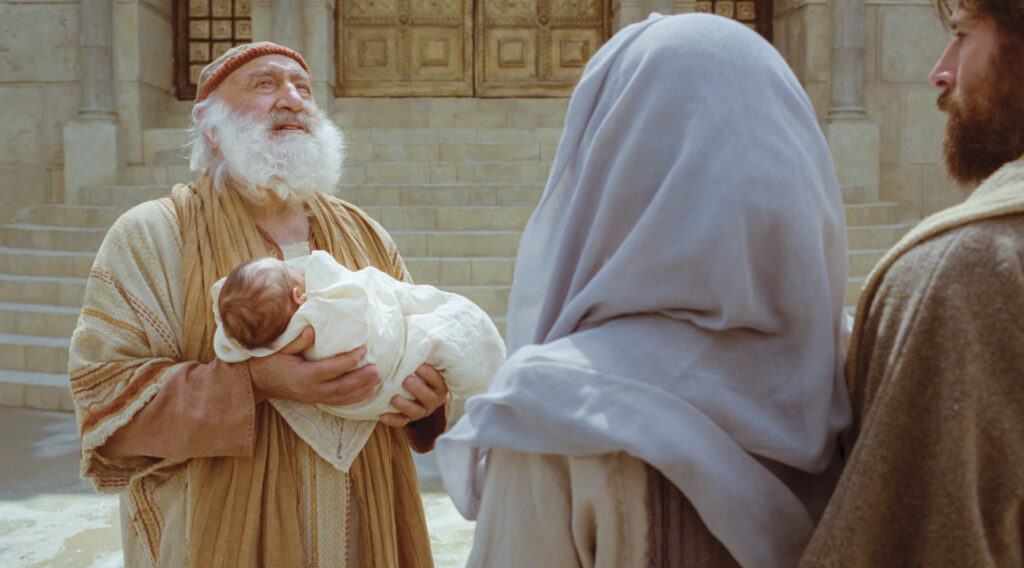What means would God use to steer Simeon in the right direction? Would an angel point the way? Would a lightning bolt split the sky?
Without fail, Simeon prayed for the Messiah to appear. Though his body was weakened by the ravages of time: a shrinking frame, a slower walk, and enfeebled eyes—his inward man was renewed day by day. He was buoyed by the hope that Christ would soon make himself known.
So, he silently watched and waited. Without thinking, he stroked his beard that was drained of colour like a whitewashed tomb. All the while, his eyes narrowed at every young man, every grown man, and every young male child that passed him by.
He knew by now the difference between his own inner voice—and wistful thoughts—and the voice of the one that set the boundaries of time and space.
Prompted by the stirrings of the Holy Spirit, Simeon made his way to the Temple. It was thick with worshippers and priests. And in the outer court, sacrificial lambs were bought and sold alongside doves in their wooden cages. It thrummed with human voices preaching, praying and petitioning God. And in the backdrop, a cacophony of nervous bleating sheep, lowing cattle and cooing pigeons filled the air.
Dressed simply, a husband and his young wife arrived at the Temple courts. Nothing distinguished them from the rest of the common folk. He was a carpenter from Nazareth. She was a peasant girl with a newborn cradled in the crook of her arm.
Simeon’s eyes fell on the baby. At that precise moment, he knew in the depths of his soul that God had come through on his promise.
He leaned in and gently scooped the baby up into his arms, and pressed him close to his heart. He held salvation—the salvation of humankind at his breast. Simeon released a long slow breath. Now he could finally rest in peace.
He was ready to die. His long wait was over, but Simeon could not contain his joyful song of praise and thanksgiving.
Lord, now lettest thou thy servant depart in peace, according to thy word:
For mine eyes have seen thy salvation,
Which thou hast prepared before the face of all people;
A light to lighten the Gentiles, and the glory of thy people Israel. (Luke 2:29-32)

This child was the glory of Israel. He would be a great prophet that would be unlike any other prophet in Israel’s history. He would be prophet, priest and king. A king that would reign on his throne forever.
Christ’s reign
In Isaiah 2:2-5, we find the prophecy of Christ’s millennial reign. Christ will sit on His rightful throne to judge and direct the nations through an era of unprecedented peace.
For many Jews, this prophecy of Christ ruling the world from Jerusalem brought hope. Their king would break the oppressive reign of the powerful Roman Empire to bring justice to the downtrodden and the poor.
God’s rescue plan—Salvation
On a spiritual plain, Messiah would come to rescue people from their enslavement to sin, and the consequences of sin—eternal separation from God in hell. The ancient writings in Isaiah 53 foretold of a suffering Messiah who would die in the place of all sinners. As a blameless servant, he would receive God’s punishment and wrath.
The innocent would die for the guilty.
Through his sacrificial death and resurrection, forgiveness of sins and eternal life would be given to those who believe on Him. The Saviour—the Lamb of God—would reconcile and reconnect the Jewish nation with God forever.
God’s inclusive rescue plan—Salvation offered to all
What did Simeon mean when he said that the Messiah would be a light to lighten the Gentiles? (Remember, Gentiles are people who are not Jews).
God’s rescue plan would not only bless his chosen people—the Jews—but all people that would embrace the good news of salvation. The Messiah would be for all, regardless of tribe or tongue, society or status, age or ability.
The truth of this promise is explained in Paul’s letter to the Ephesians. Did a Gentile, who acknowledged faith in the Jewish Messiah need to become a Jew? No. Gentile Christians would be included with Jewish Christians as members of God’s family.
That the Gentiles should be fellowheirs, and of the same body, and partakers of his promise in Christ by the gospel. (Ephesians 3:6)
The baby in Simeon’s arms was set for the accomplishment of God’s redemptive plan for all.
This necessitated a paradigm shift or a different way of seeing, especially for those of Jewish descent.
However, Simeon’s message was not over. He blessed the young couple and said to Mary,
“Behold, this child is set for the fall and rising again of many in Israel, and for a sign which shall be spoken against,” (Luke 2:34b)
Simeon’s message included some painful revelations.
Those that fall in Israel
Not all Jewish people would accept Jesus as Messiah.
Those that fall or stumble are Jews who would openly reject Christ. They would fall into deeper despair and further spiritual darkness and blindness.
Those that rise in Israel
Conversely, those that rise are Jews who would receive Christ as Lord and Saviour. They would be ushered into an intimate relationship with God and would be given eternal life.
Even when we were dead in sins, hath quickened us together with Christ, (by grace ye are saved;). Ephesians 2:5
Another perspective
There would be those in Israel who would at first fall and stumble at the rock of Christ, but rise again to receive Him.
The apostle Paul
I verily thought with myself, that I ought to do many things contrary to the name of Jesus of Nazareth. Which thing I also did in Jerusalem: and many of the saints did I shut up in prison, having received authority from the chief priests;
and when they were put to death, I gave my voice against them. And I punished them oft in every synagogue, and compelled them to blaspheme; and being exceedingly mad against them, I persecuted them even unto strange cities. (Acts 26:9-11)
How far did Paul fall and reject the Messiah? His opposition to Christ was extreme. Paul imprisoned Christians and consented to their deaths. He hunted them down in remote towns and villages. He wreaked havoc, particularly in the church at Jerusalem.
Nevertheless, Paul fell and rose after his dramatic encounter with the risen Lord on the road to Damascus. God saved him and called him to be an apostle to the Gentiles. He was successful in planting many churches, and mightily used by God to preach the gospel in Damascus, Jerusalem, Tarsus, Syria, Cilicia, Greece and Asia Minor.

What a remarkable transformation for a Pharisee and a zealous Jew. Paul became a devoted Christian—the most prominent apostle in the early church.
A sign which shall be spoken against
The Jewish people looked for signs. The birth of Jesus the Messiah was a sign, a miracle that unbelievers would reject and be spoken against. Jesus would be maligned. They would hurl verbal insults at Christ and spread rumours about him.
They would question his parentage and claim that his power was not from God, but from Beelzebub. Israel’s religious elite would arrest Jesus, and falsely accuse him of being a blasphemer and condemn him to die.
Closing words
Finally, Simeon ends his speech with a bittersweet note to Jesus’ mother.
(Yea, a sword shall pierce through thy own soul also,) that the thoughts of many hearts shall be revealed. (Luke 2:35)
A sword
What was the sword that would penetrate the heart of Mary? With the benefit of hindsight, we understand that it refers to the grief she would endure watching her own son die an agonizing and brutal death by crucifixion.
Christ would bear the sins of all humankind upon himself to pave the way for us to be made right with God.
Revealer of hearts
Jesus is the divider of men. For those that trust in his salvation, he provides deliverance from sins, and grants the gift of eternal life. Those that reject him in their hearts will face eternal damnation for their sins.
A gift is a demonstration of love from one heart to another.
Jesus is the gift of love from God to the world.
Christmas is a wonderful time to remember that we can have salvation in our very own arms.
But as many as received him, to them gave he power to become the sons of God, even to them that believe on his name: (John 1:12)
Bibliography
Author unspecified. 2013. ‘The Consolation of Israel’, Ligonier.org. Retrieved 24 November 2022 from
https://www.ligonier.org/learn/devotionals/consolation-israel
Author unspecified. 2022. ‘What does Luke 2:25 mean?’, BibleRef. Retrieved 24 November 2022 from
https://www.bibleref.com/Luke/2/Luke-2-25.html
Meyers, J. 2022. ‘Parental Preparation for Ministry’, Redeeming God. Retrieved 24 November 2022 from
Sermons on Luke
Pritchard, R. 1991. ‘The Cradle and the Cross: Simeon’s Song’, Keep Believing Ministries. Retrieved 24 November 2022 from
https://www.keepbelieving.com/sermon/1991-12-22-the-cradle-and-the-cross-simeons-song/


